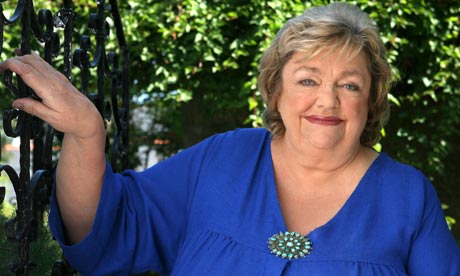
Sad news arrived late on Monday night. The Irish author Maeve Binchy, with whom I whiled away my teenage nights, following her into the heartache and hard times and eventual happiness of many a character, has died, and the world of books has lost one of its warmest, most generous writers.
Tributes are pouring in on Twitter and elsewhere from fellow authors: Ian Rankin called her "a huge presence ... a writer whose warmth extended beyond words", and "a gregarious, larger than life, ebullient recorder of human foibles and wonderment". "We've lost another beloved writer," tweeted Anne Rice. "She was a darling, I am very, very very sad," said Jilly Cooper, describing Binchy as "so kind and so funny and so captivating – she was just a brilliant, brilliant writer".
Together with Stephen King (I have an eclectic reading taste), Binchy is the author who, for me, bridged the gap between childhood reading and adult. Her novels, starting with Light a Penny Candle, and the travails and troubles of best friends Aisling and Elizabeth, were my introduction to the emotional dramas of adulthood. An ancient copy of Circle of Friends (this time the best friends are "big, soft-featured Benny, an adored only daughter, and Eve, the little bird-like orphan brought up by the nuns"), still rests on my shelves today, and looking at Binchy's bibliography, I've read well over half of them.
What I loved about her books was their big-heartedness, their friendliness – the way you could sink into them and emerge, hours later, still half in the world of a small Irish village, usually one from a time before I was born; Light a Penny Candle began during the second world war, Firefly Summer took place during the 1960s.
The stories delved into family relationships, love and loss and friendship; into the human dramas and mistakes and romances of characters who weren't so very different from me. That makes them sound a little saccharine: they weren't at all. In The Glass Lake Kit McMahon is a young girl dealing with the belief that her mother has killed herself. "Her stories came from all of us and for all of us," Rankin tweeted, and I think he's right.
They were also easy to read – not a criticism in the slightest, because sometimes that's exactly what you need. And their chattiness – which isn't as easy to pull off as it looks – stems from Binchy's view that you should "always write as if you are talking to someone. It works. Don't put on any fancy phrases or accents or things you wouldn't say in real life. Say someone cried – don't say: 'tears coursed down her face'. Take it nice and easy, don't try to impress."
I haven't read a Binchy book for years, and I'm not sure what I'd make of her more modern novels. Hearing about her death takes me right back to being 12, though, and racing through Circle of Friends one gloomy afternoon. I'm going to find my old copy later today, I think, and enjoy a little slice of Binchy magic this evening. Sad news, indeed.

